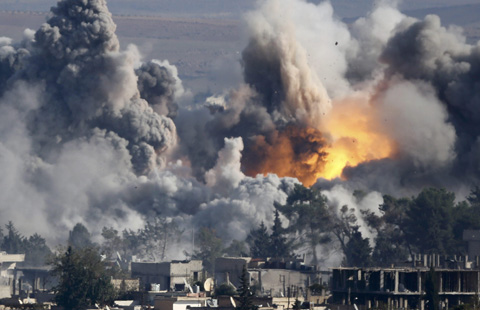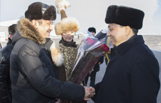Abe says to inherit past cabinets' recognition of war history
(Xinhua) Updated: 2015-01-05 19:37TOKYO-- Japanese Prime Minister Shinzo Abe said Monday he will inherit the past cabinets' historical recognition as a whole in his statement on the 70th anniversary of the end of World War II in August, local media reported.
"The Japanese administration has and will inherit statements issued by past cabinets," Abe said at the New Year press conference in Ise, central Japan.
He said his statement will refer to Japan's determination to act as a proactive contributor to world peace.
Abe also said he would like to "write Japan's remorse on the war, its postwar history as a pacifist nation and how it will contribute to the Asia-Pacific region and the world," according to Japan's Kyodo News Agency.
The government of Japan is moving to set up a panel of experts toward crafting Abe's statement on the 70th anniversary of the end of World War II, while the statement has stirred concerns worldwide, especially from Japan's neighbors, due to Abe's right- leaning policies and moves while in power in the past two years.
His administration's intention to alter the 1993 apology issued by then Chief Cabinet Secretary Yohei Kono over the "comfort women, " as well as his December 2013 visit to the notorious Yasukuni Shrine, let people question how Japan chooses to remember its wartime misdeeds.
The neighboring countries of Japan are paying close attention to whether Abe will inherit the 1995 apology and remorse stated by then Prime Minister Tomiichi Murayama for Japan's wartime aggression in Asia.
On the 50th war-end anniversary on Aug. 15, 1995, Murayama said Japan caused "tremendous damage and suffering" to the people of Asia and other countries through its colonial rule and aggression, and expressed "feelings of deep remorse" and "heartfelt apology."
Ten years later, then Prime Minister Junichiro Koizumi used the same language of remorse in his own statement which marked the 60th anniversary of war-end.
In his "New Year Thoughts" released on Jan. 1, Japanese Emperor Akihito said Japan should learn from history in 2015, which marks the 70th anniversary of the end of World War II.
China on Monday responded to Japanese Emperor Akihito and Prime Minister Shinzo Abe's new year remarks by urging the country to remain consistent in its words and actions, and to have a correct understanding about its history of aggression.






